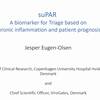Elevated suPAR and increased risk of lung cancer in healthy smokers - by dr Langkilde
suPARnostic See all
Dr Langkilde presents data on her 2011 publication in :Cancer Epidemiol Biomarkers Prev. Apr;20(4):609-18.
Increased plasma soluble uPAR level is a risk marker of respiratory cancer in initially cancer-free individuals.
Langkilde A, Hansen TW, Ladelund S, Linneberg A, Andersen O, Haugaard SB, Jeppesen J, Eugen-Olsen J.
Clinical Research Centre 136, Copenhagen University Hospital, Hvidovre, Denmark. annelangkilde@gmail.com
Abstract
BACKGROUND:
Soluble urokinase plasminogen activator receptor (suPAR) is a stable plasma biomarker associated with inflammation and disease. This study tested the association between suPAR levels and incident respiratory, gastrointestinal, or other types of cancer in initially cancer-free individuals from a general population-based prospective study.
METHODS:
Baseline plasma samples, baseline characteristics, and follow-up data were available from 2,656 individuals from the population-based Danish MONICA10 (MONItoring trends and determinants of CArdiovascular disease) study, followed for a median of 12.6 years. Cancer was diagnosed according to international classification of diseases (ICD) 8 and ICD-10 codes and suPAR levels were measured using a commercially available ELISA. The association of suPAR levels with incident cancer during follow-up was analyzed using Cox regression, adjusted for established risk factors and the inflammatory markers C-reactive protein (CRP) and leukocyte numbers.
RESULTS:
suPAR levels ranged from 0.6 to 22 ng/mL and median suPAR level was 4.01 ng/mL. An increase of 1 ng/mL in baseline suPAR was associated with adjusted HR of 1.61 (95% CI: 1.23-2.11, P < 0.001), 0.92 (95% CI: 0.69-1.24, P = 0.59), and 1.33 (95% CI: 1.13-1.58, P < 0.001) of being diagnosed with respiratory, gastrointestinal, and other cancer types, respectively.
CONCLUSION:
Elevated suPAR levels were associated with increased risk of incident respiratory cancer and other types of cancer, but not gastrointestinal cancers, independently of established risk factors, CRP, and leukocyte numbers.
IMPACT:
These findings suggest that inflammation is involved in cancer development. Risk algorithms based on established risk factors and risk-associated biomarkers should be developed and evaluated in large, general population-based studies. We suggest suPAR as a candidate for evaluation in cancer risk algorithms.
suPARnostic See all
Dr Eugen-Olsen talks on chronic inflammation and how it is linked to the...
|
|||||










































































































